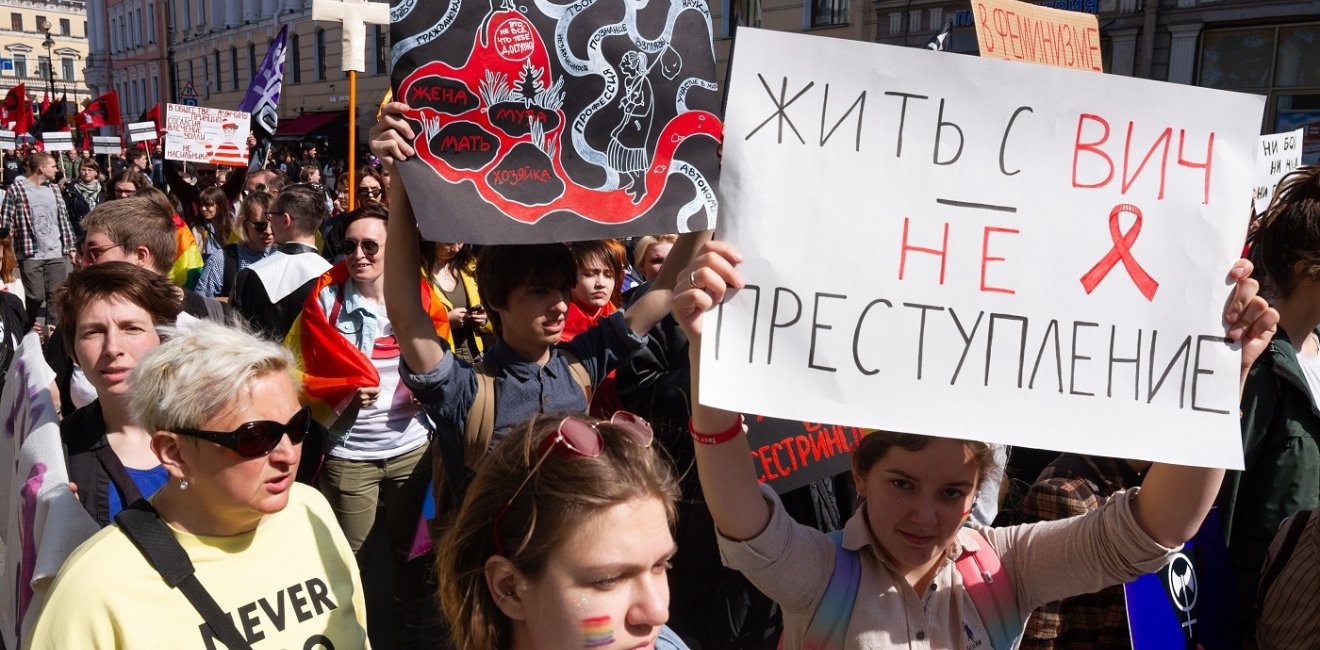
A blog of the Kennan Institute
Globally, over 39 million people are living with infection caused by the human immunodeficiency virus (HIV), according to the Kaiser Family Foundation. Over one million of this number live in Russia. The World Health Organization considers acquired immunodeficiency syndrome (AIDS), caused by HIV, to be an international public health epidemic.
While the Russian government has taken some limited action to mitigate this crisis, the measures are inadequate to address the root of the problem. Instead of tackling the epidemic’s causes, the Russian government is sending those who are incarcerated and living with HIV to the front lines to help wage its war in Ukraine. Such pacts with the devil, along with stigmatization, legal corralling, and refusal to provide treatment, mean that HIV/AIDS has evolved into a massive human rights problem in Russia.
The HIV Epidemic in Russia
As recently as 2022, Russia was cited as having the fifth highest rate of new HIV diagnoses globally. The Russian Health Ministry dismissed such assessments as “provocative propaganda.” The high prevalence of HIV is attributable to multiple factors, including high rates of intravenous drug use and unprotected sex among high-risk populations.
The Russian government has rejected the traditional tried-and-true epidemic responses, including sex education, HIV care and treatment, and other harm reduction tools, many of which have been successful in such countries as Thailand.
Today, Russia’s response remains muted, and the crisis continues to grow. The rate of infections is estimated to increase by 10 percent to 15 percent per year, meaning that up to 150,000 Russians will be diagnosed with HIV in 2023 alone. Russia’s population is over 140 million people. For comparison, in the United States, with a population of over 330 million, approximately 36,000 are estimated to be infected in 2023.
Additionally, Russia remains one of the most dangerous places in the world for individuals who identify as LGBTQ+. An anti-gay propaganda bill was passed several years ago, and there is no sign of abatement in the hatred expressed toward the LGBTQ community. Legal and societal reproof further drive vulnerable populations away from seeking treatment, even when it is available.
Instead of implementing changes to address the situation, Russia is headed in the opposite direction. A 2021 report from Human Rights Watch documented how a twenty-nine-year-old Russian living with HIV was attacked after his HIV-positive status became public. A police investigation yielded no arrests. Sadly, such are not isolated incidents.
Red HIV Wristbands
In 2023, new reporting indicated what was previously considered unthinkable: in exchange for providing life-saving antiretroviral treatment (ART) to Russian convicts living with HIV, the Russian government began demanding that they serve in the Russian Armed Forces. Many were sent to the front lines. It was estimated that 20 percent of all new Russian Armed Forces recruits from prisons had HIV.
Those Russian service members who are living with HIV infection are made to wear red wristbands, indicating their HIV status. There are even reports that some doctors refuse to provide them with medical treatment or battlefield first aid because of their status.
It is not currently known how many in the Russian military live with HIV. Some estimates are as low as several thousand. Official Russian Ministry of Defense figures are believed to be inaccurate, as most Russian service members are not tested for the virus.
While the Russian military currently lists HIV as a disqualifying medical condition, reporting by Meduza shows that the process to achieve disqualification is arduous and official guidance often is not followed. One individual reported that a military recruiter, when informed of the prospective service member’s HIV status, said, “Do you give a damn where you die?”
Even in cases where the Russian military is aware that an individual has been diagnosed with HIV, there is no current evidence to show that these individuals are receiving the ART needed to keep them healthy.
Everyone Has Rights
Those on the front lines of the war in Ukraine who are taken prisoner must be provided by the Ukrainian government with adequate medical care, in accordance with the Geneva Conventions. Current data are not available, but in light of the difficult environment and high rates of HIV among Russian convicts conscripted to serve in the war, there are likely significant challenges to treating Russian prisoners who are HIV-positive.
UNAIDS is the UN organization charged with coordinating global action on HIV/AIDS around the globe. It is headquartered in Geneva, adjacent to the World Health Organization. As part of its work, UNAIDS is central to the implementation of the International Covenant on Economic, Social, and Cultural Rights (ICESCR). One of the rights enumerated in the ICESCR is the “right of everyone to the enjoyment of the highest attainable standard of physical and mental health.” The Russian Federation is a signatory to the covenant, but Russia’s current practices are not in line with its treaty obligations.
Russia Must Acknowledge the Crisis
Key to addressing the HIV crisis is first acknowledging that such a crisis exists. While Vladimir Putin has previously addressed the HIV crisis, the limited actions taken by the Russian government and the tendency to punish and delegitimize those who are infected have only contributed to a further degradation of the situation.
Second, Russia must provide access to ART to those living with HIV, regardless of whether an individual is a convict, a conscript, or a citizen. It is possible to slow the spread of the epidemic by treating those who are living with HIV so that their viral loads reach an undetectable level and the virus can no longer be transmitted.
Finally, Russia must undertake a campaign to educate the public and reduce the stigma around HIV infection. Safer-sex education, including for heterosexual partners, and education in the dangers of needle sharing and other intravenous drug use activities should halt the increase in HIV infections in the country, including among the armed forces. Stigmatizing those with the virus but forcing individuals to wear armbands trumpeting their status is degrading and humiliating, and a massive violation of the right to privacy.
In conclusion, while Russia’s HIV crisis has evolved to the point that the spread of infection is out of control, there are important, and known, next steps that can be taken to contain the epidemic and respect the human rights of affected individuals at the same time. This steps are acknowledging that there is a crisis, making treatment available, and destigmatizing a positive diagnosis through education.
The opinions expressed in this article are those solely of the author and do not reflect the views of the Kennan Institute, the Department of Defense, or the United States Government.
Author


Kennan Institute
The Kennan Institute is the premier US center for advanced research on Eurasia and the oldest and largest regional program at the Woodrow Wilson International Center for Scholars. The Kennan Institute is committed to improving American understanding of Russia, Ukraine, Central Asia, the South Caucasus, and the surrounding region through research and exchange. Read more

Explore More in The Russia File
Browse The Russia File
Chechnya as a Model of Modern Russia

Russia’s Indigenous Communities and the War in Ukraine

Gas and Power in a Changing US–Russia Relationship

